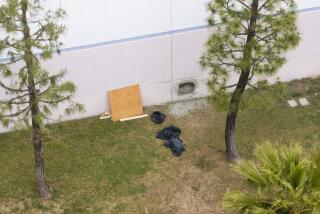Vault Holds Treasure in Top Vintages
- Share via
SORRENTO VALLEY — People come to Gary Parker’s bank every day to make deposits and withdrawals.
It’s a curious kind of bank. There are no tellers. You can’t get a loan of any kind. And powerful air conditioning keeps the temperature at a constant 59 degrees.
Parker is the president, owner, and sole employee of the Executive Wine Bank, a wine storage facility. His clients include doctors, engineers, scientists--people who appreciate fine wines but don’t have a proper place to store them at home.
Ron Ridgway, a North Park veterinarian and owner of Silas St. John restaurant in Kensington, rents wine storage space in the basement of his veterinary office, but Parker’s is the only business in San Diego devoted primarily to the storage of wine.
Parker once worked as the maitre d’ and wine steward at the 926 restaurant in Pacific Beach, but got the idea for operating a commercial wine cellar while working as a wine salesman. “People would tell me, ‘I’d buy more if I had a place to store it,’ ” he said.
“I opened this place two years ago. I started it off just as a hobby, to see if there was a need for it, and it turned out there was.”
Currently there are 28,000 bottles, worth a total of about $700,000, stored at the Executive Wine Bank, and there is a waiting list for new customers. Parker said the average customer stores 35 cases (374 bottles), but Dennis Parker--no relation to Gary--is among the customers who store less.
An assistant editor at the Reader, Dennis Parker said he decided to transfer 10 cases of wine from beneath his house to the wine bank last summer, when temperatures were creeping upward. “The wine is worth about $1,000--some of the bottles are worth $20 each--and I decided that since I had so much invested in it, it should be stored right,” he said.
Gary Parker pointed out that selecting a carefully temperature-controlled place for storing wine is important, because wines age in relation to the temperature. The warmer the temperature, the faster a wine ages, and no one wants to discover that hundreds--perhaps thousands--of dollars’ worth of wine has turned to vinegar while it was sitting beneath a staircase or atop a refrigerator.
Parker charges $8 to store a case of wine for a year, and $425 to store 60 cases. He’ll even drive to your house, pick up your wine and cart it off to his reinforced wooden “lockers,” all with individual door locks. Of course, customers can come in any time to check on their investment.
“It’s kind of a ceremony when someone comes in to pick up their wine,” said Parker. “Some people come out once a week, and sort of scuttle through their lockers and pet the bottles. By the time they leave they’re all in a lather.
“My typical customer is a married male, 35 years of age, with an income between $30,000 and $60,000. These people know more about wine than the average person, but some have simply had a few bottles they liked, and want to learn more.
“The majority live in condos or town houses, and some of them move frequently. They just don’t have a proper place to store their own wine.”
A few of his customers are simply waiting for their wines to increase in value before selling them for a profit. A bottle of 1983 Chateau Margaux sells for about $65, but in five years it might be worth more than $100, Parker said. “The longer you wait, the better it gets--and the more valuable.”
Refrigerated home storage units that hold 60 bottles of wine are on the market, providing an alternative to storing wine in a vault like Parker’s even if you don’t have your own wine cellar. But the units sell for a minimum of about $600, and Parker pointed out that if they break down, your wine can warm up, perhaps disastrously, while you wait for a new part or a repairman to arrive.
Besides, Parker said with a laugh, too often an enophile (that’s a wine connoisseur) will uncork a good bottle for his friends late at night, long after they have passed the stage when they can truly appreciate it.
“This storage arrangement is safer. It lends itself to discipline,” he said, gesturing at the thousands of bottles in his vault. “You have to plan what you’re going to drink.”
More to Read
Inside the business of entertainment
The Wide Shot brings you news, analysis and insights on everything from streaming wars to production — and what it all means for the future.
You may occasionally receive promotional content from the Los Angeles Times.










